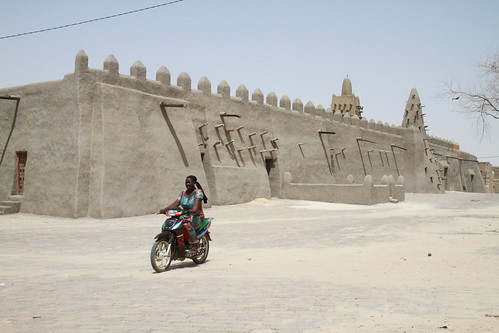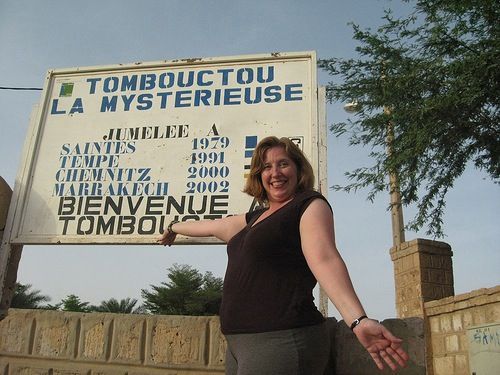24 Hours in Timbuktu
 We have arrived in Timbuktu, the city in the sand.
We have arrived in Timbuktu, the city in the sand.
To get there, we boarded a 19-seater prop plane in Mopti, along with a group of travel agents from Europe on a fam trip, and we instantly felt like we were back in the American Midwest. There was some Jimmy Buffet being piped into the cabin. When the captain began announcements, we were flabbergasted — this guy was 100 percent American.
“Welcome aboard, ladies and gentlemen,” he said in such a way that a morning radio talk show host would envy. “We have one of the best flight attendants in Mali working for us . . . Unfortunately, she’s not here today. Instead, you have Monsieur Bamato. He’s okay, too.”
Jenny and I laughed. “Wow, what is this guy doing in Mali,” I wondered outloud.
Jenny responded: “He’s probably a retiree just flying to keep his license active.”
When the flight was nearly over, the flight attendant told us that we could go visit the American pilot in the cockpit. But only one of us could go. Jennifer was closer to the door, and it was still close to her birthday, so I didn’t fight it.
As it turned out, the guy (Noah from Connecticut) was pretty young and he came to Africa to take a job with Mali Air Express, because jobs were scarce in the United States.
Instead of sending Jennifer back to her seat next to me, Noah asked her if she wanted to stay while the plane landed.
“I can do that?” she asked.
He simply responded: “This is Africa.”
So there she was, in the cockpit, for the landing in Timbuktu — probably one of the most unforgettable experiences she’ll ever have. Lucky bitch.
Timbuktu, on the other hand, is not the kind of place that would stick in your mind if it weren’t for its famous name, synonymous for being in the middle of nowhere. It’s just a small dusty town, with a large number of museums, living in the shadow of its former glory as an important trading center on the camel caravan trail.
And now, it’s biggest industry — tourism — is suffering, too. Recently, a group of French tourists were kidnapped by Al Qaeda in neighboring Niger and brought to some remote location in the Sahara Desert over the border into Mali. The French government has been trying to pressure Mali to do more to secure the borders and the way best way to do it is by warning its citizens not to travel to Mali unless it’s absolutely essential. Timbuktu is considered part of the “red zone.”
This politicized drama is just hurting the local population who depend on income generated by tourism. There are so few foreigners visiting now, which has caused restaurants and other businesses to shutter permanently.
In fact, that’s why the group of travel agents from Europe (the ones who were on our plane to Timbuktu) are here. The Malian tourism agency wanted to show people that Mali is safe to visit.
Jennifer and I haven’t noticed anything out of the ordinary. I take that back; everything is extraordinary — for us. I should say that we haven’t felt unsafe here. We have our own security team in place — in the form of an entourage of children that follow us everywhere around town.
Two boys, who wanted to practice their English, walked with us to a museum. They followed us when we headed to the post office to get the mandatory Timbuktu postmark on our postcards. They came with us when we got a snack. They were still with us when we went to the internet cafe. But finally they ran home for dinner, but they were back outside our hotel the next morning before school, waving at us when we drove away heading back to the airport to fly back to Dakar.


Comments